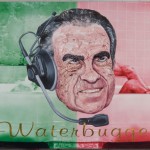The phrase "October Surprise" is now part of the American political lexicon, referring to some last-minute event that might change the course of a U.S. presidential election. But the two prototypical "October Surprise" cases, in 1968 and 1980, have never earned a place in mainstream American history.
The October Surprise allegations of 1968 and 1980 also were something of a misnomer since they centered on Republican efforts to block an October Surprise by sabotaging game-changing diplomatic successes by incumbent Democratic presidents. In 1968, it was Lyndon Johnson achieving a breakthrough in the Vietnam War peace talks. In 1980, it was Jimmy Carter securing the release of 52 American hostages held in Iran.
Recent disclosures from the National Archives as well as statements from participants have shed new light on these dark chapters of U.S. history -- and revealed previously unknown links between the 1968 case and the Watergate scandal of 1972 and between the 1980 Iran-hostage case and the Iran-Contra Affair of 1985-86. The new evidence suggests a more continuous narrative connecting these scandals and thus represents a powerful challenge to the established history.
Possibly the most notorious "October Surprise" case -- and the first of this modern era -- occurred in fall 1968 when Republican Richard Nixon was locked in a tight presidential race with Democratic nominee, Vice President Hubert Humphrey, and President Johnson was making progress in Vietnam peace negotiations.
At that point, a half million American soldiers were in the war zone and more than 30,000 had already died, along with Vietnamese dead estimated at about one million. In late October 1968, Johnson saw a chance for a breakthrough that would involve a bombing halt of North Vietnam and a possible framework for peace.
However, Johnson encountered surprising resistance from U.S. allies in South Vietnam. President Nguyen van Thieu was suddenly laying down obstacles to a possible settlement in the Paris peace talks.
On Oct. 29, 1968, Johnson got his first clear indication as to why. According to declassified records at the LBJ Library in Austin, Texas, Eugene Rostow, Johnson's Under Secretary of State for Political Affairs, got a tip from Wall Street financier Alexander Sachs who said that one of Nixon's closest financial backers was describing Nixon's plan to "block" a peace settlement.
Nixon's backer was sharing this information at a working lunch with his banking colleagues in the context of helping them place their bets on stocks and bonds. In other words, the investment bankers were colluding over how to make money with their inside knowledge of Nixon's scheme to extend the Vietnam War.
Eugene Rostow passed on the information to his brother, Walt W. Rostow, Johnson's national security adviser. Eugene Rostow also wrote a memo about the tip. "The conversation was in the context of a professional discussion about the future of the financial markets in the near term," he wrote. "The speaker said he thought the prospects for a bombing halt or a cease-fire were dim, because Nixon was playing the problem ... to block. ... They would incite Saigon to be difficult, and Hanoi to wait."
In a later memo providing a chronology of the affair, Walt Rostow said he got the news about the Wall Street lunch from his brother shortly before attending a morning meeting at which President Johnson was informed by U.S. Ambassador to South Vietnam Ellsworth Bunker about "Thieu's sudden intransigence."
Walt Rostow said "the diplomatic information previously received plus the information from New York took on new and serious significance," leading Johnson to order an FBI investigation that soon uncovered the framework of Nixon's blocking operation. [To read that Rostow memo, click here, here and here.]
From the FBI wiretaps, Johnson quickly learned about the role of Nixon campaign official (and right-wing China Lobby figure) Anna Chennault contacting South Vietnam's Ambassador to the United States Bui Diem regarding the political importance for President Thieu's continued boycott of the Paris peace talks.
Nixon's "Treason"
After reading these secret FBI cables, Johnson began working the phones to counter the Nixon campaign's gambit. According to recordings of the phone calls that have since been declassified, Johnson complained to Senate Republican Leader Everett Dirksen about the subterfuge.
On Nov. 2, just three days before the election, an angry Johnson telephoned Dirksen at 9:18 p.m., to provide details about Nixon's activities and to urge Dirksen to intervene forcefully.
"The agent [Chennault] says she's just talked to the boss in New Mexico and that he said that you [South Vietnam] must hold out, just hold on until after the election," Johnson said. "We know what Thieu is saying to them out there. We're pretty well informed at both ends." [Johnson believed "the boss in New Mexico" was Nixon's running mate, Spiro Agnew, who was there on a campaign trip.]
Next Page 1 | 2 | 3 | 4 | 5 | 6 | 7 | 8 | 9
(Note: You can view every article as one long page if you sign up as an Advocate Member, or higher).






